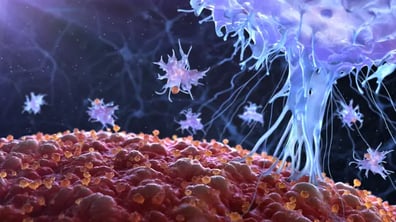The non-linear rise of cancer immunotherapy
As early as the 1890s with William Coley’s use of heat-killed bacteria to induce anti-cancer immune responses it was hypothesized that the immune system could function to inhibit the development of cancer. Although the field of immuno-oncology progressed in fits and starts several key discoveries continued to buoy the field including discovery of IL-2, autologous TIL therapy, discovery of tumor antigens, and the development of monoclonal antibodies. The early successes in immuno-oncology were limited. Durable immune responses were rare, and many therapies were highly toxic. A deeper understanding of relevant immune system mechanisms was holding the field back.
Positive and Negative Immune System Responses
Immune checkpoints were further examined, leading to discoveries of components within the immune system such as cytotoxic T lymphocyte-associated antigen 4 (CTLA4) and programmed cell death 1 (PD1). To move forward, cancer immunotherapies or immuno-oncology would need to include strategies that encompassed both the effector functions and also included negative regulators of the immune system response.
Immuno-Oncology Today
In 2022 the FDA approved multiple immune-oncology therapies including novel bispecific T cell engagers (tebentafusp-tebn, teclistamab-cgyv, and mosunetuzumab-axgb), a second BCMA targeted CAR-T cell therapy (ciltacabtagene autoleucel) and additional checkpoint inhibitors (relatimab-rmbw and nivolumab, and tremelimumab). The development of these immunotherapies from discovery to market was enabled by concepts of immunoediting and a greater understanding of the tumor microenvironment (TME) and immune system interactions. Tools that allow for genomic profiling, immunohistochemistry, and flow cytometry also played essential roles developing these advancements. In addition, physicians have more experience and tools to prevent and spot immune-related adverse effects such as cytokine release syndrome which is frequent in patients treated with bispecific T cell engaging and CAR-T therapies.
-

Oncology - Clinical oncology - Clinical Trials
Driving Oncology Trial Execution with Novel Data-Driven Approaches to Site and Patient Identification
- |
Fueling Developments in Immuno-Oncology
As we move deeper into this decade, the science around immunotherapy in cancer treatment is still evolving. New immune targets have been identified and are giving rise to new immune checkpoints, such as LAG-3, TIM-3, TIGIT, and HHLA2 plus therapeutic targets that are part of co-stimulatory pathways such as OX40, ICOS, or 4-1BB. Other cell types outside of T cell focused therapies such as NK cells, macrophages, and iPSCs are also being studied in the clinic. Immuno-oncology has become part of a more comprehensive and holistic cancer treatment plan that seeks to better understand the right combinations and sequences to incorporate conventional therapies with immune-oncology agents.
Leveraging Technological Advances
The technology around medicine has also progressed, and those advances are not limited to oncology. Better molecular characterization of disease and biomarker focused research has allowed identification of novel molecular drivers of cancer and targets for new therapies. In addition to improving drug target identification, these advancements can drive patient stratification and enhance response evaluations. Likewise, tumor profiling has seen some significant developments that will continue to fuel technological advances in cancer immunotherapy development.
Planning for Complexity
Technological advances are helpful, but they require more than scientific discovery and understanding to be useful in a clinical trial setting. Researchers should expect increased trial complexity. In some cases, this may mean selecting sites with the capabilities to support these clinically advanced trials. Still, more often, the challenge will be how well the site, or even the organization running the study, is able to handle the increased volumes of data required to run these modern immuno-oncology trials. Researcher experience will come into play, as well as comprehensive adverse event reporting and data visualization to streamline study insights.
Finding a Way Forward in Cancer Immunotherapy
The first decade of modern immuno-oncology greatly accelerated the pace of innovation in cancer therapy.
Read our lessons learned from the evolution of immune-oncology >




